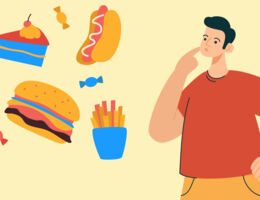
July 14, 2025—Stress is unavoidable, and its tentacles can extend into every part of your life, including your eating habits. Whether your stress is short-term (acute), long-term (chronic) or both, it's helpful to notice how it affects your appetite and food choices.
How stress influences appetite
Acute stress, says the American Psychiatric Association, puts your body into "fight or flight" mode. It's your natural response to an immediate threat. Acute stress may reduce your appetite while your body figures out how to handle the threat.
On the other hand, chronic stress can last for a long time and stimulate your appetite, according to AARP. That's due to your body's release of stress hormones, including cortisol. Chronic stress keeps cortisol levels high, which can make you crave comfort foods that contain a lot of sugar, fat or salt.
Everybody is different, however. Some people may eat less when experiencing long-term stress, for example. This could be because chronic stress can increase the risk of depression, which often results in a lower appetite. For others, eating habits may not change much at all.
One thing is for sure: Prolonged stress-related eating—also called emotional eating—can lead to unhealthy eating habits and weight gain. And while comfort food feels good at first, it might end up making you feel physically and mentally worse. It doesn't resolve the problem that created your stress, and it can lead to a cycle of cravings, overeating and guilt.
Managing stress eating
Although you can't prevent all stress, you can take steps to cut back on emotional eating. Paying more attention to how you feel before you start eating is a great place to start, according to HelpGuide.
Identify your hunger. Are you experiencing emotional hunger or physical hunger? There's a difference. Emotional hunger happens suddenly, produces specific food cravings, doesn't stop when your stomach is full, and can lead to feelings of regret and guilt. Physical hunger comes on gradually. When you're truly hungry, you'll eat almost anything, and you stop when you're full.
Pay attention to eating triggers. What makes you want to eat? Having a stressful day or feeling bad about yourself can make you want to dull your emotions with comfort food.
Wait five minutes before eating. When a craving strikes, try to wait it out. Take a few deep breaths. While you're waiting, check in with your emotions, noticing them without judgment.
Keep healthy snacks on hand. Stock your pantry with foods and beverages that satisfy and nourish you.
Practice mindful eating. This can help you slow down and pay more attention to both your food and your feelings. Learning how to eat mindfully can help you appreciate your food and change your relationship with it.
Learn how the food you eat—and your eating habits—can boost your mental state.
Sources
- AARP. "Tame Your Stress Eating." https://www.aarp.org/health/healthy-living/emotional-eating/.
- American Psychiatric Association. "How Stress Affects Eating Habits: Not One-Size-Fits-All." https://www.psychiatry.org/News-room/APA-Blogs/How-Stress-Affects-Eating-Habits.
- HelpGuide. "Emotional Eating and How to Stop It." https://www.helpguide.org/wellness/weight-loss/emotional-eating.
- HelpGuide. "Mindful Eating." https://www.helpguide.org/wellness/nutrition/mindful-eating.